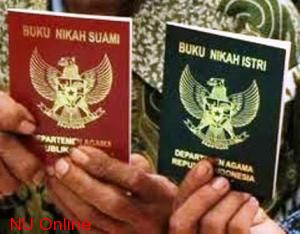Jakarta, NU Online
The Central Board of Nahdlatul Ulama (NU) called on Nahdliyin (NU followers) not to perform unregistered marriages (nikah siri). Nahdliyin need to record the status of marriage in the local Office of Religious Affairs (KUA).<>
Secretary of the Supreme Council of NU Mujib Qoliyubi told NU Online here on Thursday (7/3), saying the Nahdliyin need to comply with the procedures of marriage in accordance with the applicable laws.
"Unregistered marriages are still valid under the religious laws (sharia). Yet, the status of those performing unregistered marriages is illegal in terms of citizenship and residency rights," Mujib Qoliyubi said.
The call was made for considering unmarriage marriages do not guarantee the legal rights and obligations for the those performing the marriages. The unregistered marriages are not binding positive laws. In fact, a citizen of both the husband and the wife should receive legal guarantees for the benefit of both, he said.
Many cases of unregistered marriages have come to the fore, as women have not been able to claim their rights as a wives as stated in Law No. 1/1974 on marriage. Their rights include the right to housing and post-divorce rights, such as jointly held property. The loss of their marital rights will also affect children born of the unregistered marriage.
Under the law, marriage is defined as a bond between the inner (batin) and outer (lahir) of a man with a woman as husband and wife to form a family, happily and eternally.
Unlike a conventional marriage, a nikah siri is not registered with the Religious Affairs Ministry. Consequently, parties to a nikah siri do not have marriage certificates.
Aceng is not alone in his nikah siri. What has transformed the story of the regent’s unregistered marriage into a national issue is his status as a public figure and as a leader who people look up to. People assume the regent is knowledgeable about the laws in force in Indonesia, including the marriage law.
However, it turns out that election as a regent does not guarantee that one possesses knowledge of the law, which became apparent after Aceng gave several interviews on television.
Some of the regulations allegedly flouted by the regent include Law No. 1/1974 on marriage, Law No. 7/1989 as amended by Law No. 3/2006 and the second amendment of No. 50/2009 on religious courts, Government Regulation No. 9/1975 on the implementation of Law No. 1/1974, Presidential Instruction No. 1/1991 on compliance with of Islamic law, and Government Regulation No. 10/1983 as amended by Government Regulation No. 45/1990 on marriage and divorce for civil servants.
The Marriage Law and its derivative rules define a marriage as legitimate if it is conducted according to the laws of an individual religion. The 1974 law clearly stipulates that marriage registration is mandatory.
Unfortunately, the penalties imposed for violation of the article on marriage registrations are too lenient. Government Regulation No. 9/1975 says that failure to register a marriage is punishable by a Rp7,500 (78 US cents) fine, which is far from a deterrent. The popular acceptance of unregistered Islamic marriage ceremonies and the very light penalties for their non-registration may have aided the spread of nikah siri in Indonesia.
Editor: Sudarto Murtaufiq
Writer: Alhafiz Kurniawan
Terkait
Terpopuler
1
Khutbah Jumat: Ramadhan dan Kesempatan yang Tidak Selalu Terulang
2
Keluar Mani yang Tidak dan Membatalkan Puasa
3
Khutbah Jumat: Ramadhan, Melatih Sabar, Memperkuat Syukur
4
Khutbah Jumat: Tiga Kebahagiaan Orang Puasa
5
Kultum Ramadhan: Keutamaan Tarawih dan Witir
6
Khutbah Jumat: 4 Cara Menghidupkan Malam Ramadhan dengan Ibadah
Terkini
Lihat Semua



